Ellen and Jim Have a Blog, Too
We are two part-time academics. Ellen teaches in the English department and Jim in the IT program at George Mason University.


Compelled yet again by _Clary_: fidelity as evaluative · 8 February 08
Dear Judy,
Thank you for your reply.
I’ve been struggling with my stance over the past few months. I don’t want to move to make fidelity a general evaluative criteria for lots of reasons. Among them it’s not realistic. You suggest that when a film-maker titles his work the name of the book, “they are asking for comparisons to be made, even if it doesn’t amount to pledge.” The comparison can be contrasting: the analogous films like the 1999 Rozema MP is a contrast. Rozema is disingenous about her aims because of the unexamined point of view of cult and fan Janeites who wield enough influence to make a film a flop. Again and again I find evidence everywhere that the decision to be apparently faithful (to keep the cardinal hinge points of the story, major characters and famous lines) is a commercial one: the film-maker is trying to bring an audience in who want a substitute or replacement for the book (most have not and will not read it), and trying to please fans, often disingenuously.
And fidelity to the book does not make a good movie, nor is it truly possible. We’ve talked of this before. I would put down the failure of the recent 2007 MP by the way to the determination of the film-makers to hit those cardinal points in the first 50 minutes of a 100 minute or so film; the result was an absurdity. They just didn’t have the time and couldn’t even be wholly coherent. The movie improved in the second half when they moved well away from the book and could slow down.
On the other, I am well aware that the deepest pleasures I can have with a movie is when it is apparently faithful or comparatively faithful enough (making changes for commentary, updating, aesthetic reasons as the film is a different media and must communicate diffently), and think that in the tiny minority of films where faithfulness or comparative faithfulness is kept up, it can be and at least sometimes is a major preoccupation of the film-makers themselves.
Right now I’m studying (viewing very slowly) the 1991 BBC/WBGH Clarissa, script by two people, one of whom I know to be a serious eighteenth century scholar, David Nokes (great book on Gay, good one on Austen, articles &c&c), and can recognize that Nokes has brought to the film his knowledge of 18th century poetry; some of the visuals (like the birds whose necks Lovelace wrings after he shoots them down) come from poetry by Pope (Windsor Forest):
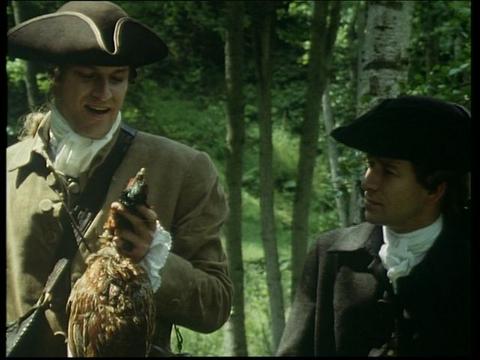
Robert Lovelace (Sean Bean) and Jack Belford (Sean Pertwee) with bird with wrung neck
Nokes has Clarissa quote Cowley on true wit to great effect and makes an 18th century moral usage of masquerade: very deadly and condemned in the film.
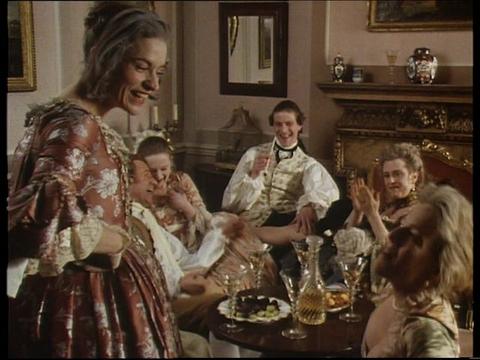
The false Lady Betty (Diana Quick) congratulated by Lovelace and his hired accomplices (prostitutes and sycophantic male). In context, it is electrifyingly chilling when she throws off her wig
But I doubt I will be able to write about this film on my blog, much less someday try a paper My God I’d have to reread Richardson’s Clarissa!!!!—and I’ve told myself more than once I’ve read this mad book enough! But that’s not it.
Why would it be hard to write about the film at length in a real essay? It’s too close, the film comes near me in just the way the book once did. I’m even a bit embarrassed at myself. I find for the first time since my first readings I am dreading the experience as I put my DVD in the vln viewer; it’s so painful to go through, I am distressed. Yet I want to watch in fascinated horror, and I feel horror, and when I start the feeling becomes obsessive. When I’ve described how I read the book for the first time when I was 18 or so, I usually make a half-joke of how I stayed up into the night, read for 16 hours in a row, couldn’t stop, and then when I discovered I missed the rape (it’s announced in the briefest of letters), I went back to try to find it, only to discover I would have to read another several hundred pages because the full description is held off until Clarissa manages to flee Lovelace, find security under the protection of Belford and writes long trembling anguished half-nightmarish letters of description to her friend, Anna Howe. But in reality it was not funny. What’s happening is terrifying, horrible, so bad it’s difficult to define its reach sufficiently, & it’s very important that its horror be recognized as deeply cruel and taken seriously.
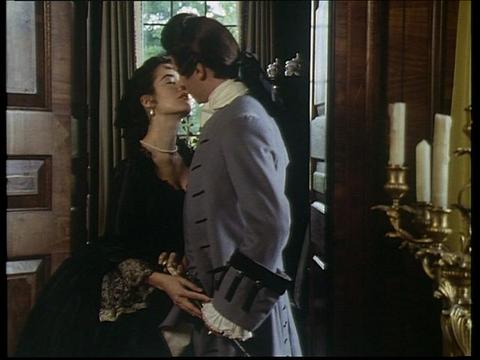
The incestuous James ((Jonathan Phillips) and Bella (Lynsey Baxter) Harlowe plot to destroy their sister; he’s to go off to duel with Lovelace
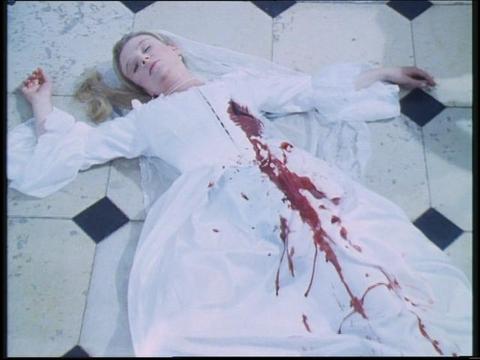
Clarissa (Saskia Wickham) as bride: a nightmare while her parents are coercing her to marry Solmes; it’s Lovelace who knifes her though
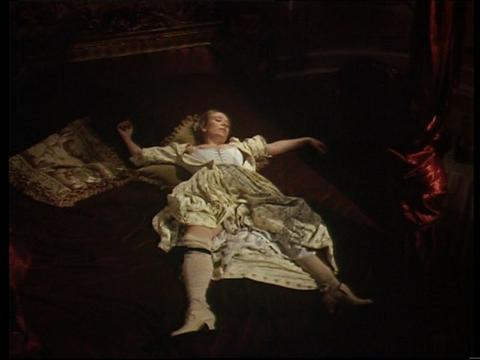
Clarissa just after rape
This film in other words re-accomplishes for me what 4 decades since my teen years inured me to; I didn’t feel this way when I reread the book in the mid-1990s in a cyberspace setting with other readers. That’s central to its greatness, to its achievement.
I feel the same kind of richness in watching the 1983 Mansfield Park. I find tears of joy coming to my eyes as Fanny goes to the ball and has such a happy time; I’ve no doubt whatsoever my strong emotions here are a product of reading the book as well as watching the movie.
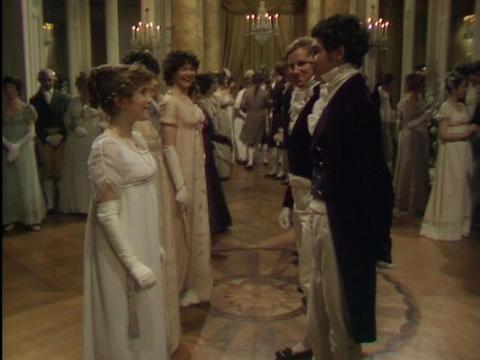
Fanny Price (Sylvestre le Tousel) and Henry Crawford (Robert Burbage) as lead couple
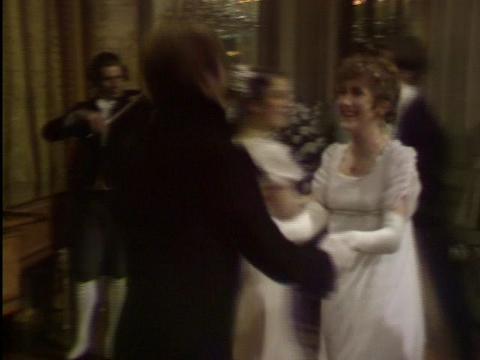
Fanny and William Price (Allen Hendrick) ) dance gaily a lively gig
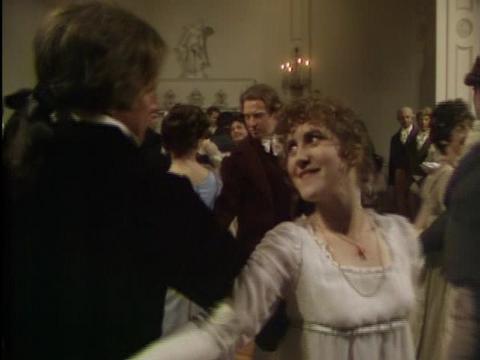
Fanny Price and Edmund Bertram (Nicholas Farrell) dance a dance of stylized love
The problem is probably finding some scheme or stance or line of argument where one can take fidelity into consideration as an element, but where it does not overtake the discourse—however, how not overtake the discourse when you want to tell other scholars of the book Clarissa they are dead wrong when they reject the movie. They are (I would say) showing they have not begun to understand how movies work, partly because they refuse to lend themselves utterly seriously to the form as it does create embarrassment. It’s voyeuristic for a start. And of course still despised in part because in the commercial marketplace so many are trash – but then so are so many novels. We forget that :)
Perhaps this is why I am so determined to try to find an accurate typology, thinking to myself if I have accurate subgenres then a portion of movies will have fidelity as a criteria even for evaluation and the others not. A problem here is the disingenuousness of film-makers who claim faithfulness when there is little; to persuade people the majority of whom do take statements at surface value (and are not always listening carefully anyway) makes this disingenuousness a stumbling block beyond the low status of most movies still.
Enough from me for today,
Elinor
--
Posted by: Ellen
* * *
Comment
- If the result is really a good movie in its own right, fidelity doesn’t seem to matter, just as fidelity itself does not make good film. An example for me is “Walt Disney’s Jungle Book”. Fidelity was not a big issue; it was fun. Films of the Thirty-Nine Steps always have to ad-lib, because although the idea of the book is strong, I don’t think it well written. A lot of “and then”. I think J.K. Rowling had a lot of control over the first Harry Potter film, and it didn’t make for good cinema. Where fidelity does seem to matter is where there is a cheap and lazy pillaging of somebody else’s imagination. You will forgive the comments of an amateur. There is one other possibility. Mozart in Amadeus takes Salieri’s sweated composition of greeting, and effortlessly turns it into something like the march in Figaro. “Great artists do not borrow ideas, they steal them.”
— Martin Feb 8, 12:46pm # - This whole question is endlessly fascinating and complicated. I do like your point that a title could point a contrast as well as, or instead of, promising “fidelity” to the text.
To be honest, I’m finding myself going round in circles over this whole question, and realise that I’m constantly contradicting myself – one minute I’m arguing that fidelity isn’t important, and the next I’m remembering an adaptation where I was furious over a changed ending or character, although perhaps I would think differently if I were to see the film or mini-series in question again.
This whole question of fidelity is making me think that I’d like to read a book (or maybe more than one) about the practice and theory of adaptation from literature to film. Looking at Amazon.co.uk, I see there are a number of such books available, some of which look interesting when I dip in, but they seem to be prohibitively expensive and it doesn’t look as if my local library has any of them (well, I already pretty well know what film books they have there!)
Anyway, I’ll give the details of a couple of titles I noticed which quite drew me when I read the openings, just in case you are interested too… these were ‘Adaptations: From Text to Screen, Screen to Text’ by Deborah Cartmell and Imelda Whelehan
http://www.amazon.co.uk/gp/product/041516737X/ref=sib_rdr_dp – this, inevitably, looks to be out of print, and very expensive!
and ‘Literature and Film: A Guide to the Theory and Practice of Film Adaptation’ by Robert Stam and Alessandra Raengo, which I think includes discussion of the Rozema MP, though it looks as if this one gets bogged down in theoretical jargon after a bit… but I don’t know whether there may be other books on the subject which are more helpful and/or easily available. I also don’t know if any of these books contain typologies – some do seem to begin by discussing “faithful” adaptations and then go on to the freer/looser kinds.
Here’s a link to a section from the Stam and Raengo book which discusses the negative moralistic connotations of words like “fidelity” and “betrayal” – the passage I want to point out is about three pages in, under the heading ‘The Roots of a Prejudice’, (separate from the discussion of the Charlie Kaufman film ‘Adaptation’) but I don’t seem to be able to post a link just to that bit:
http://tinyurl.com/342okm
It strikes me that I myself sometimes watch a film as a substitute for a book I may never get round to, or have forgotten – but I’m increasingly realising how completely separate the two things are, and that one can’t be a substitute for the other. Thank you for making me think more about this whole area, which, it now strikes me, also ties in with our discussions in the past about literary sequels and pastiches – another kind of adaptation?
— Judy Feb 8, 3:53pm # - From Clare:
“I’ve read the blog and was fascinated with the interchange between you and the male student. I’m rather hampered in that I’ve actually seen only a small proportion of the films. This is a situation I intend to remedy in the coming months. I’m most interested in how you resolve your problems with fidelity & your typology.
Clare (who has spent far too much of this morning reading your blog, and ignoring the chores.)”
— Elinor Feb 9, 7:55am # - Dear Judy and Clare,
I’ll start from the conclusion of Judy’s: the way I put it to myself when I go to a movie where I’ve not read the book but am interested in it or think I will not bother or have the time to read it is: “the movie may possibly give me some idea of what the book is about.” It’s not a substitute; it’s a replacement. But then I can get irritated if I surmize it is very far from the book or has fundamentally misrepresented it (from what I’ve gathered by reading about the book or its author). The movie can operate to make me want to read the book because it has roused my curiosity, as in The Jane Austen Book Club and Becoming Jane (which by reading I discovered to be a book which is either ludicrously stupid or written in bad faith -- and it's important for a Jane Austen scholar to know that). I can be amused to discover that I predicted the way a movie changed the book.
Then I jump back to Judy’s first paragraph: if I ever did get angry when a film mispresents a book totally, I don’t anymore. It’s not totally useless if you are much read critic and can complain outloud in some venue where many readers read. Then perhaps you can help the film to do less well, and then perhaps the next time the film-maker makes a film he or she will hesitate. That’s the only use I see in the published cavillings. Make the film-makers scared their films will do less well. But most of the time they will not regret what they did, and the result may be disingenuousness or the kind of thing we see in the first half of the 2007 MP. So it’s wasted energy. Judges have long ago (in the 1930s cases) decided that film-makers need not be faithful even after they signed a contract with an author promising to be.
Some of the lying is after all political. Lost Horizons, book and film are anti-war, so the film is savagely cut to make it pro-war.
The first version of The Quiet American made the American villain a hero! Feminist books are turned into misogyny. The people who made these films don’t care what the perceptive audience thinks. All we can do about these is vote with our pocket-books. Never go to such a film which you perceive as lying and never rent or buy it. As we avoid liars :)
Thank you for the online essay I’ve bookmarked it. It is a bit jargon-y: because the author derives his points from an interpretation of a movie.
As I’ve said before (sorry to repeat), the book to read first is Brian McFarlane’s Novel into Film. He is a foundation book. All film studied refer back to him at some point (and Bluestone who is no where as good). McFarlane studies 5 filmes in terrific depth (there’s a still-by-still analysis and description at the back of the book). He uses Wagner’s terms (transposition = faithful; commentary = analogous; analogous = free) but flexibly. The value of his book is he takes a strongly comparative approach while valuing the film. Its usefulness lies his terms: it’s he who came up with the idea of “cardinal hinge points” (and other terms like “enunciation” for the same event being presented differently as in the end of 2007 Persuasion); through his terms he enables the viewer to herself distinguish a faithful type film. You don’t have to have seen all his films to read his book.
I have the Whelehan and Cartmell Adaptations. The problem is the essays in it are too short to do close readings. But this is true of most books. I did find somewhat more substance and interest in Giddings & Sheen’s The Classic Novel from page to screen; Whelehan and Cartmell’s Cambridge Companion to Literature on Screen does have essays which tell the history of film interpretation and also how films have changed, and goes into genres. A rare one not cited much but good because it deals with TV is George W. Brandt’s British Television Drama in the 1980s.
Clare, my view of the debate I had with the young man is that he takes far too favorable a view of Davies because Davies’s vision pleases him. He’s not hurt by it.
Finally, I wish I had more courage: if I did, I'd write a paper of the type one takes to a conference on the Clarissa film. I'd like to speak or use language of the kind I have in my blog. I might have a nervous breakdown before getting up there :).
E.M.
— Elinor Feb 9, 8:17am # - Thank you for recommending the McFarlane – I do remember looking for it before, but, unfortunately my local library system doesn’t have it (they seem to have very few film books in general), and it is prohibitively expensive to buy. But I will keep an eye out for it in the hope there may be second-hand copies available at a more reasonable price in the future – often bargains do turn up. In the meantime, I may manage to read one or two of the essays via “search inside” at Amazon.:)
Thank you also for the information on the other titles. I’ve also found that some books about older films I’ve managed to get hold of (the library clearly bought more of these titles in the 1970s!) tend to give very short accounts rather than any kind of close readings… and sometimes if the book was written before the advent of video tapes, let alone the internet, the accounts are also full of mistakes, because the author hasn’t had a chance to check back and rewatch key scenes.
I think now that we are in the world of DVDs and cable movies, there would be room for many more books (or blogs) which do analyse in more depth and do these close readings.
I do agree there is little point in getting angry about an adaptation which misrepresents a book, even though I have wasted time fuming about this sort of thing in the past.
— Judy Feb 9, 1:36pm # - Just to add that I’ve just seen the stills you have now added in – they are perfect. Well done in finding or freeze-framing them! I’m looking forward to watching ‘Clarissa’ again, and maybe will watch the older MP again too when I have time.
— Judy Feb 9, 2:54pm # - I looked up McFarlane’s book at Bookfinder.com and Amazon and discovered it’s out of print and copies start at $51; the second lowest is $100. How discouraging.
The GMU library has film studies of adapations of high status books, but nowhere near a full library of them. There is a real prejudice again film adaptations. This is a subgenre which does not have full support of its community (film critics).
Ellen
— Elinor Feb 9, 10:35pm # - Thank you for the praise on the stills, Judy. I incline to think that I didn’t choose the really important stills from Clarissa, the film. I should have chosen stills from during the rape: Lovelace’s cold mean determined face as he grasps the handrails of the bed, his enjoyment of his mastery over this helpless creature; how the bed rocked suggested in the stills of the women on the side holding on; and especially Saskia Wickham’s face. I couldn't catch the agonized recoil of her body as a still is a split second from a movement image.
I hadn’t the courage, nor trust in my readership. The problem with discussing the novel and film is you must discuss the sex centrally, and you need to deal with the problem of pornography. The film got over this by presenting a chaste version of what happens in the book and leaving Wickham fully clothed. I too fear that people coming over to my blog might enjoy watching the rape or misunderstand my purpose.
I mention this because this is a partial version of the barrier to writing for real about the movie. Another is traditional critics’ dislike of the film and intense desire to dismiss it -- which I think comes from embarrassment when they are forced really to look at physically what they have been studying in displaced imaginative intangible (and therefore easily partly censored versions) through their books.
Ellen
— Elinor Feb 10, 9:09am # - Must say I think the stills you have chosen are very striking in themselves – the juxtaposition of the two scenes of Saskia Wickham as Clarissa lying down in particular. I think perhaps people have to see the film to take in the rape – as you say, there is a danger people might look at stills of it for the wrong reasons.
I didn’t realise some critics had disliked the film. What a pity.
— Judy Feb 11, 4:17pm # - I did try to capture Fanny’s great moment of joy. In terms of Austen's oeuvre, it may be significant that it’s again a young girl’s dream of a dance in this sense: NA, the first novel to center on the dance was originally written early (perhaps 1792-3) and Austen herself never having married or been able to go off from her family on her own as an adult remained in heart and mind centered on a young girl’s dream. MP then takes us back to NA. The one finished novel where there is no dancing as a central scene is Persuasion.
I did pick parallel stills for Clarissa; that masquerade flung away, Lovelace wringing a beautiful bird’s neck are epitomes.
E.M.
— Elinor Feb 11, 8:41pm #
commenting closed for this article
